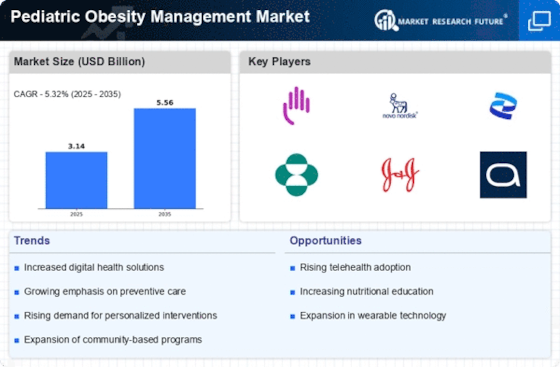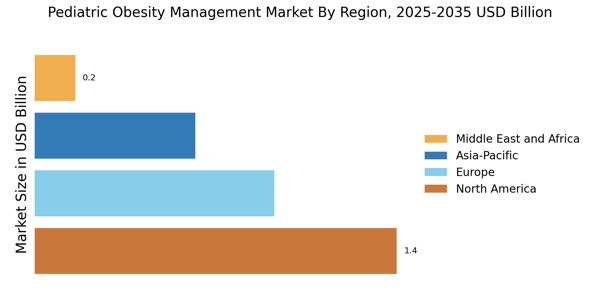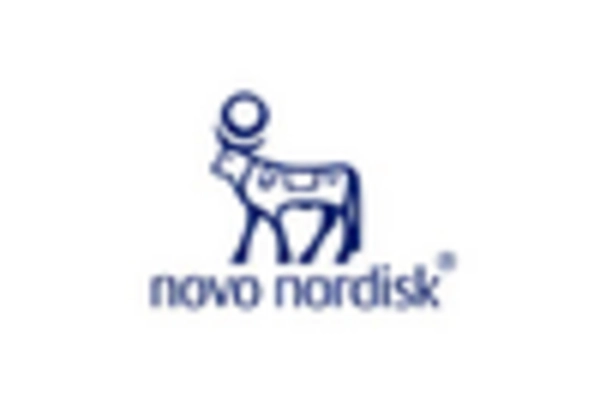Government Initiatives and Policies
Government initiatives aimed at combating childhood obesity significantly influence the Pediatric Obesity Management Market. Various countries have implemented policies to promote healthier eating habits and physical activity among children. For instance, regulations on food marketing to children and the introduction of nutritional guidelines in schools are becoming more prevalent. These initiatives not only raise awareness but also create a supportive environment for obesity management programs. The financial backing and resources allocated by governments to tackle this public health crisis are expected to enhance the availability and accessibility of pediatric obesity management solutions, thereby fostering growth in the market.
Rising Prevalence of Pediatric Obesity
The increasing prevalence of pediatric obesity is a primary driver for the Pediatric Obesity Management Market. Recent statistics indicate that approximately 18% of children aged 2 to 19 years are classified as obese, a figure that has been steadily rising over the past two decades. This alarming trend necessitates effective management strategies to combat obesity-related health issues such as diabetes, hypertension, and psychological problems. As awareness grows regarding the long-term consequences of childhood obesity, healthcare providers, parents, and policymakers are increasingly prioritizing interventions. This heightened focus on addressing pediatric obesity is likely to spur demand for innovative management solutions, thereby propelling the Pediatric Obesity Management Market forward.
Increased Parental Awareness and Involvement
Parental awareness regarding the implications of obesity on children's health is a crucial driver for the Pediatric Obesity Management Market. As parents become more informed about the risks associated with obesity, they are more likely to seek out management solutions for their children. This trend is reflected in the growing demand for educational resources, dietary programs, and physical activity initiatives tailored for children. Furthermore, studies suggest that parental involvement in obesity management can lead to more effective outcomes. Consequently, the increasing engagement of parents in their children's health is likely to stimulate the Pediatric Obesity Management Market, as they actively pursue strategies to mitigate obesity.
Technological Advancements in Health Monitoring
Technological advancements in health monitoring tools are transforming the Pediatric Obesity Management Market. The proliferation of wearable devices and mobile applications designed to track physical activity, dietary habits, and overall health metrics is empowering both children and parents. These technologies facilitate real-time feedback and personalized recommendations, which can enhance adherence to obesity management programs. Moreover, the integration of artificial intelligence and data analytics into these tools allows for more tailored interventions. As technology continues to evolve, its role in pediatric obesity management is expected to expand, potentially leading to more effective and engaging solutions for children.
Emergence of Multidisciplinary Treatment Approaches
The emergence of multidisciplinary treatment approaches is reshaping the Pediatric Obesity Management Market. This paradigm shift involves collaboration among healthcare professionals, including pediatricians, dietitians, psychologists, and physical trainers, to provide comprehensive care for children struggling with obesity. Such holistic strategies address not only the physical aspects of obesity but also the psychological and social factors that contribute to it. Research indicates that multidisciplinary interventions can lead to more sustainable weight management outcomes. As healthcare systems increasingly recognize the value of integrated care, the demand for multidisciplinary programs is likely to rise, thereby driving growth in the Pediatric Obesity Management Market.

















